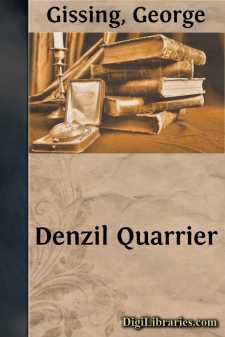Literary Collections
- American 84
- Ancient, Classical & Medieval 14
- Asian 1
- Australian & Oceanian 1
- Canadian 55
- Continental European 121
- English, Irish, Scottish, Welsh 179
- Essays 160
- General 24
- Letters 46
- Middle Eastern 1
Literary Collections Books
Sort by:
by:
John Burroughs
EMERSON AND HIS JOURNALS I Emerson's fame as a writer and thinker was firmly established during his lifetime by the books he gave to the world. His Journals, published over a quarter of a century after his death, nearly or quite double the bulk of his writing, and while they do not rank in literary worth with his earlier works, they yet throw much light upon his life and character and it is a...
more...
by:
Bret Harte
JEFF BRIGGS'S LOVE STORY.I.It was raining and blowing at Eldridge's Crossing. From the stately pine-trees on the hill-tops, which were dignifiedly protesting through their rigid spines upward, to the hysterical willows in the hollow, that had whipped themselves into a maudlin fury, there was a general tumult. When the wind lulled, the rain kept up the distraction, firing long volleys across...
more...
Our theme for the hour is the American Newspaper. It is a subject in which everybody is interested, and about which it is not polite to say that anybody is not well informed; for, although there are scattered through the land many persons, I am sorry to say, unable to pay for a newspaper, I have never yet heard of anybody unable to edit one. The topic has many points of view, and invites various study...
more...
by:
George Gissing
CHAPTER 1 At eight o'clock on Sunday morning, Arthur Peachey unlocked his front door, and quietly went forth. He had not ventured to ask that early breakfast should be prepared for him. Enough that he was leaving home for a summer holiday—the first he had allowed himself since his marriage three years ago. It was a house in De Crespigny Park; unattached, double-fronted, with half-sunk basement,...
more...
THE FOREIGNER AT HOME “This is no’ my ain house; I ken by the biggin’ o’t.” Two recent books, one by Mr. Grant White on England, one on France by the diabolically clever Mr. Hillebrand, may well have set people thinking on the divisions of races and nations. Such thoughts should arise with particular congruity and force to inhabitants of that United Kingdom, peopled from so many different...
more...
INTRODUCTORY SKETCH The title naturally suggested for this story was "A Dead Soul," but it was discarded because of the similarity to that of the famous novel by Nikolai Gogol—"Dead Souls"—though the motive has nothing in common with that used by the Russian novelist. Gogol exposed an extensive fraud practiced by the sale, in connection with lands, of the names of "serfs"...
more...
by:
George Gissing
CHAPTER I For half an hour there had been perfect silence in the room. The cat upon the hearthrug slept profoundly; the fire was sunk to a still red glow; the cold light of the autumn afternoon thickened into dusk. Lilian seemed to be reading. She sat on a footstool, her arm resting on the seat of a basket-chair, which supported a large open volume. But her hand was never raised to turn a page, and it...
more...
by:
Andrew Lang
THE SECOND CABIN I first encountered my fellow-passengers on the Broomielaw in Glasgow. Thence we descended the Clyde in no familiar spirit, but looking askance on each other as on possible enemies. A few Scandinavians, who had already grown acquainted on the North Sea, were friendly and voluble over their long pipes; but among English speakers distance and suspicion reigned supreme. The sun was soon...
more...
OF COMPANIONS AND FLATTERERS An old acquaintance who met me this morning seemed overjoyed to see me, and told me I looked as well as he had known me do these forty years; but, continued he, not quite the man you were when we visited together at Lady Brightly's. Oh! Isaac, those days are over. Do you think there are any such fine creatures now living as we then conversed with? He went on with a...
more...
by:
Bret Harte
CHAPTER I Just where the track of the Los Gatos road streams on and upward like the sinuous trail of a fiery rocket until it is extinguished in the blue shadows of the Coast Range, there is an embayed terrace near the summit, hedged by dwarf firs. At every bend of the heat-laden road the eye rested upon it wistfully; all along the flank of the mountain, which seemed to pant and quiver in the oven-like...
more...











